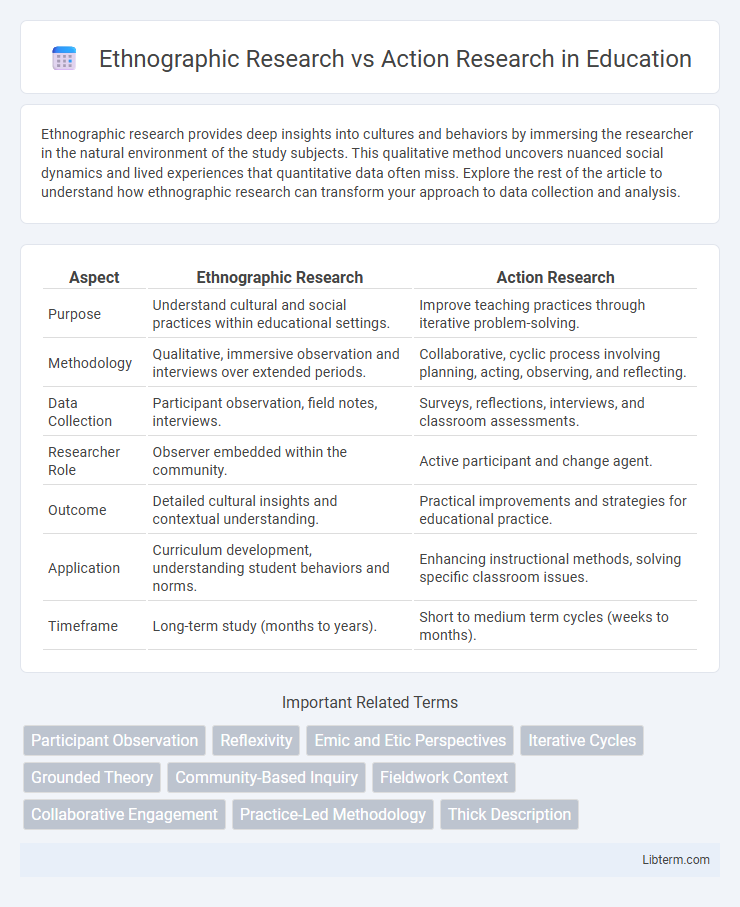Ethnographic research provides deep insights into cultures and behaviors by immersing the researcher in the natural environment of the study subjects. This qualitative method uncovers nuanced social dynamics and lived experiences that quantitative data often miss. Explore the rest of the article to understand how ethnographic research can transform your approach to data collection and analysis.
Table of Comparison
| Aspect | Ethnographic Research | Action Research |
|---|---|---|
| Purpose | Understand cultural and social practices within educational settings. | Improve teaching practices through iterative problem-solving. |
| Methodology | Qualitative, immersive observation and interviews over extended periods. | Collaborative, cyclic process involving planning, acting, observing, and reflecting. |
| Data Collection | Participant observation, field notes, interviews. | Surveys, reflections, interviews, and classroom assessments. |
| Researcher Role | Observer embedded within the community. | Active participant and change agent. |
| Outcome | Detailed cultural insights and contextual understanding. | Practical improvements and strategies for educational practice. |
| Application | Curriculum development, understanding student behaviors and norms. | Enhancing instructional methods, solving specific classroom issues. |
| Timeframe | Long-term study (months to years). | Short to medium term cycles (weeks to months). |
Introduction to Ethnographic and Action Research
Ethnographic research involves immersive observation and detailed study of people's cultures and behaviors within their natural environments, aiming to understand social dynamics and meanings from an insider perspective. Action research emphasizes collaborative problem-solving and iterative cycles of planning, acting, observing, and reflecting with the active participation of stakeholders to improve practices or address specific issues. Both methodologies prioritize qualitative data but differ in purpose: ethnography seeks deep cultural insights, while action research focuses on practical change and community involvement.
Defining Ethnographic Research
Ethnographic research is a qualitative method focused on exploring and understanding cultural phenomena through immersive observation and detailed documentation of participants' behaviors, beliefs, and interactions within their natural environment. This approach aims to provide a holistic and in-depth interpretation of social practices and meanings from the perspective of the studied group. Unlike action research, which emphasizes collaborative problem-solving and change, ethnographic research prioritizes descriptive insight and contextual comprehension.
Defining Action Research
Action research is a participatory and iterative research approach aimed at solving real-world problems through collaborative inquiry and change implementation. It involves cycles of planning, acting, observing, and reflecting to improve practices or address community issues. Unlike ethnographic research, which focuses on comprehensive cultural understanding, action research prioritizes practical interventions and continuous feedback within a specific context.
Key Objectives of Each Research Method
Ethnographic research aims to deeply understand cultural behaviors, social interactions, and community norms through immersive observation and qualitative data collection. Action research focuses on solving practical problems within specific contexts by involving participants collaboratively in the research and implementing iterative cycles of planning, acting, and reflecting. Key objectives of ethnography include detailed cultural insights and contextual understanding, while action research prioritizes practical solutions and organizational or community improvement.
Methodological Approaches Compared
Ethnographic research employs immersive observation and qualitative data collection to understand cultural phenomena within natural settings, emphasizing participant perspectives and social interactions over extended periods. Action research combines iterative cycles of planning, acting, observing, and reflecting to solve practical problems collaboratively with stakeholders, integrating both qualitative and quantitative methods for immediate application and continuous improvement. Methodologically, ethnography prioritizes deep contextual understanding through thick description, while action research focuses on participatory problem-solving and change facilitation within organizational or community contexts.
Data Collection Techniques
Ethnographic research primarily utilizes participant observation and in-depth interviews to collect rich, contextual data reflecting cultural and social dynamics within natural settings. Action research employs iterative cycles of planning, acting, observing, and reflecting, integrating methods such as surveys, focus groups, and collaborative workshops to engage participants actively in data generation and problem-solving. Both methodologies prioritize qualitative data but differ in the researcher's role and the dynamic interaction between data collection and intervention.
Roles of the Researcher
Ethnographic research requires the researcher to immerse deeply in the cultural context, observing and interpreting behaviors as an insider while maintaining analytical distance. In action research, the researcher actively collaborates with participants to implement and assess changes, blending roles of facilitator, learner, and change agent. Both methodologies demand reflexivity, but ethnographers prioritize understanding meaning, whereas action researchers focus on practical problem-solving and co-creation of knowledge.
Advantages and Limitations
Ethnographic research provides deep cultural insights through immersive observation, revealing authentic behaviors and social interactions, but it is time-consuming and may suffer from researcher bias. Action research emphasizes practical problem-solving within communities, promoting collaboration and immediate application of findings, yet it often lacks generalizability and may face challenges in maintaining objectivity. Both methodologies enhance understanding in social sciences, with ethnography excelling in contextual depth and action research driving transformative change.
Suitable Applications and Contexts
Ethnographic research is suited for in-depth cultural studies and understanding social behaviors within natural settings, often applied in anthropology, sociology, and market research to explore participant perspectives over extended periods. Action research is ideal for problem-solving in organizational or community settings, emphasizing collaboration and iterative cycles to implement and evaluate practical changes in education, healthcare, and business environments. Both methodologies complement each other by providing contextual insights and actionable solutions, but ethnography prioritizes observation and immersion, while action research focuses on participatory intervention.
Choosing the Right Research Approach
Choosing the right research approach depends on the research goals, context, and desired outcomes. Ethnographic research is ideal for in-depth understanding of cultural practices and social interactions through immersive observation over extended periods. Action research suits contexts requiring iterative problem-solving and stakeholder collaboration to implement practical changes and improvements within organizations or communities.
Ethnographic Research Infographic

 libterm.com
libterm.com